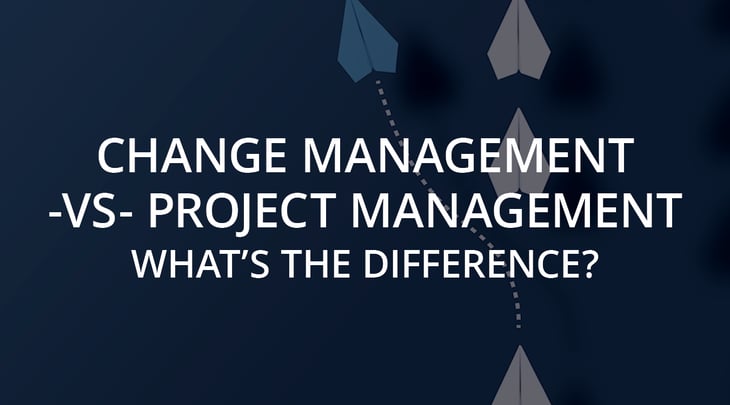Change Management vs. Project Management: What’s the Difference?
Change Management and Project Management are easily confused, especially when large-scale changes are taking place in an organization.
____________________________________
And while they do overlap in some areas, each has a different focus and priorities. To effectively manage change-oriented projects (so you can, for example, minimize disruption and encourage adoption), it’s important to understand how Change Management and Project Management are similar and how they’re distinct.
Ultimately, the secret is to utilize an integrated approach, strategically aligning change and project managers. However, it can be easy to lock into tunnel vision with the more easily-quantifiable Project Management, over-emphasizing the process side of things and overlooking the people in and around the process itself. Thus, proper implementation of both approaches is crucial.
Let’s look at the differences between them and how an integrated approach leverages both pieces to move your organization from its current state to your desired state.
Project Management
Project Management, the process in place to carry out the project itself, is focused on tasks and requirements. The objective is built around defined steps and goals, with a target date for completion. The process can vary, but typically has the following stages:
- Initiate
- Plan
- Execute
- Monitor
- Control
The process typically follows well-documented guidelines and standards like PMBOK, following highly formalized processes with clearly defined phases, goals, and deliverables. The main takeaway here: Project Management is very focused on the steps and processes specifically necessary for completing a project, but it’s not necessarily focused on the individuals that will be affected or the incentives that will prompt their buy-in for the change in the project will bring. That’s where Change Management comes in.
Change Management
Change Management is focused on the people side of a given project – that is, it is focused on the individuals that are affected by the changes the project creates. Change Management practitioners can help alleviate the uncertainty that frequently accompanies projects which bring change to an organization. Change, even when positive, can cause stress, confusion, and anxiety. Thus, resistance is very common, and it can often be difficult to assess the underlying causes. Change Management helps to properly prepare and incentivize key stakeholders to buy into change, and will typically have the following stages:
- Plan for change
- Manage change
- Reinforce change
Change Management practitioners will help with the overall adaptation to the changes taking place. They create strategies for communicating the need for change and how it will positively impact the end-users. They will work to get buy-in and focus on adoption practices.
Unlike Project Management processes, there are several methodologies for Change Management practices. The key is that the approach needs to be adapted to the culture and needs of each unique organization and its people. This can be one of the most challenging pieces of the project – which is often why it is neglected or not an area of focus. As people and organizations can be highly dynamic in nature, Change Management practitioners need to also be agile and adjust as needed – often shifting approaches on the fly.
The Interlink Approach – Project and Change Management Together
The key is to have an integrated approach for alignment between project managers and change management specialists. When they work together through strong communication and collaboration, you can mitigate risk, have faster and more embedded user adoption, and better achieve the ROI that you are looking to achieve.
At Interlink, we realize the importance of both when it comes to the technology projects we work on with our clients. Our project managers are trained in Prosci principles and methodologies, bringing their expertise to the table for every project they help implement. We also have a dedicated Change Management practice with both practical knowledge from the field as well as scholarly knowledge from advanced degrees and studies in academia. Our team works hand in hand with our clients to enable success with a focus on both people and processes.
Need Help Getting Started with Change Management?
Want to assess your team’s capacity for change? Request a free Change Management Strategy Call with Interlink. On the Strategy Call, we will discuss best practices for Change Management for your next project – whether it is with Interlink or not! For us, it means a great chance to show off our expertise, and for you, it means finding new ways to make your projects more successful. We’ll ask you to take a quick 5-minute survey so we can better understand your ideal change methodology, then we’ll schedule a call to unpack the results and dive into a discussion around strategy.
Rachael Narel
Rachael Narel is Interlink's Employee Engagement and Productivity Practice Lead focused on helping our customers leverage technology, process, and people practices to successfully achieve organizational outcomes. Her practice optimizes usage of several Microsoft tools including Viva, Copilot, SharePoint, and Power Platform. Rachael has over 20 years of experience working in the IT and software fields in both team and leadership roles. Her diverse background includes organization development, change management, strategic planning and process improvement, user adoption, and training. Rachael has a PhD in Organization Development and a Master of Science in Management and Organizational Behavior.


